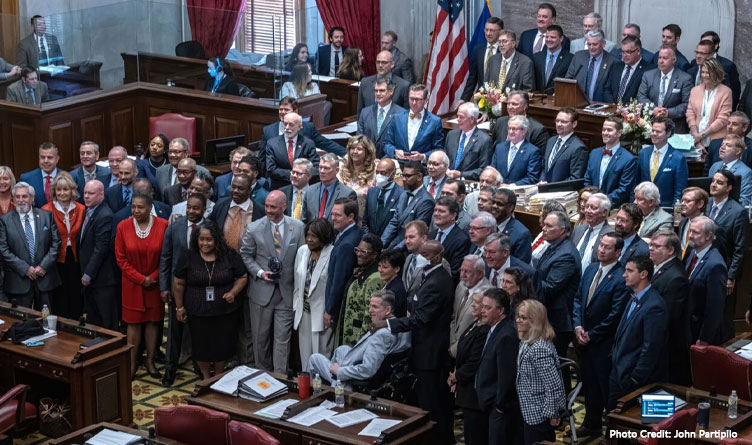Photo: The day before the Tennessee General Assembly ended business, members posed for a photo. Photo Credit: John Partipilo
By Sam Stockard [Tennessee Lookout -CC BY-NC-ND 4.0] –
The Legislature adopted an ethics reform bill on the final day of the 112th session, one supposedly designed to shed more light on so-called dark money.
Affected Non-profit groups will not have to disclose their donors but they will have to report any time they spend more than $5,000 on campaigns within 60 days of an election. The idea is to let people know how much groups spend to target candidates.
Under the measure adopted Thursday, these groups won’t have to file as political action committees, but they will have to report to the Registry of Election Finance when they hit the threshold.
Simple communications with an organization’s members are exempt, too, as long as those individuals agree to receive them. Campaign fodder that goes out more than 60 days before an election also will be able to stay up on social media sites in the final two months before an election.
Sen. Ferrell Haile, a Gallatin Republican who ferried the bill through the Senate for Lt. Gov. Randy McNally, told lawmakers Thursday he’s heard more feedback from folks back home on this bill than any other this session, including K-12 school funding and Titans stadium money.
“The question’s arisen: What’s the big deal? … What are you hiding?” Haile said.
Aside from the “dark money” stuff, lawmakers will have to report just about every dollar they receive and spend. Even fish bowl collections that bring in more than $2,000 will have to be itemized once they top that figure.
Two things that were dropped were additions to the Registry of Election Finance and term limits, which brought a sigh of relief to those members who pour every ounce of their spirit into policing campaign finances.
Rep. Sam Whitson, R-Franklin, who carried the bill for House Speaker Cameron Sexton, would like to have done more, calling it a yearly “battle” in the Legislature.
But considering some folks thought this would get bogged down and killed, Whitson wound up with a pretty major accomplishment.
It won’t be his swan song, though, and if more indictments come up in the campaign vendor and PAC scandal that has rocked the House for two years, his job will be a lot easier.
K-12 funding blather
Every once in a while, state Rep. Terri Lynn Weaver gets fired up.
Thursday, she denounced the governor’s K-12 funding bill, saying she wondered why special interest groups spent hundreds of thousands of dollars to influence the Legislature’s decision. She harkened back to 2009 when the Legislature took federal funds for the Race to the Top and wound up with Common Core, a national curriculum she’s still trying to eradicate.
She noted The Sycamore Institute took $100,000 from the Gates Foundation, according to the funding report, “to support the adoption of an equitable funding formula to improve educational opportunities for all K-12 students in Tennessee.”
Weaver added that SCORE (State Collaborative on Reforming Education), a proponent of the funding plan, was given $650,000 and Chambers of Commerce across the state received $100,000.
As a result, the state is dealing with ideologies and books that don’t mesh with Tennessee’s philosophy, she said.
“We in this chamber become more and more neutered about our influence in what we can do when it comes to education. Silence is a better word,” she said.
Other opponents come from a different angle, saying the funding plan is designed to set a funding amount for each child in the state based on their learning needs and then siphon it off when they go to charter or private schools.
Proponents contend it’s better than the 30-year-old Basic Education Program, which is so complex that only a handful of people in state government understand it.
With a “historic” injection of $1 billion slated for K-12 education when the new formula starts in fiscal 2023-24, bill sponsors say every district in the state will see an increase.
During Thursday debate, Rep. Kirk Haston, a Perry County Republican, said the formula should give school districts more control over their state funds.
Metro Nashville, though, will draw $22 million more, while Shelby County Schools will net another $115 million, which partially explains why so many Shelby County legislators voted for the bill.
But questions linger in the back of people’s minds – or in the front – about the impact in five to 10 years when districts have to start boosting their share. Will it require major tax increases?
Even Rep. Scott Cepicky, R-Culleoka, pointed out that as Maury County’s “fiscal capacity” grows, its percentage of state funding will decrease.
The plan has an accountability factor, too, that could be problematic, requiring 70% of third-graders to be “proficient” in reading. Only a third are reading at the expected level now.
Otherwise, the school district will have to come up with an improvement plan, and the state could step in and take control of their money.
To stave this off, they’re putting $500 more a year toward each child in kindergarten through third grade to deal with literacy. But will it be enough and will districts put the money where it’s expected?
A day after debate was cut off with a procedural move, the bill saw plenty of discussion Thursday and passed 63-24 in the House and 26-4 in the Senate, sending it to the governor for his signature.
Missing in action
Considering the K-12 funding plan was Gov. Bill Lee’s major initiative for the year, some folks were surprised he skipped the end of the session, which governors usually attend.
Instead of touting its passage, he went to Athens for a photo opp at the Helen Ross McNabb Center and then to Lee University in Cleveland for an awards banquet.
In his place, the media received this statement, “Today is a tremendous day for Tennessee students. After months of engagement with thousands of Tennesseans, our state will have a new, innovative K-12 funding formula that improves public education by putting kids first. I commend the General Assembly for their partnership and desire to move Tennessee public education to a new frontier.”
He might have boycotted the Legislature’s adjournment because it also passed a truth-in-sentencing bill that kills some of his criminal justice reform efforts. It took a compromise of sorts to pass that, including dropping half of the violent crimes on a list that will require a 100% sentence. The lesser ones will require an 85% sentence. All of this is expected to drive up prison costs, and while victims’ advocates are satisfied, there’s no guarantee people’s lives will be changed when they get out of prison.
Talk surfaced about whether lawmakers would need to hang around in case Lee vetoes the prison bill. But Speakers Cameron Sexton and McNally said Thursday they didn’t think he would.
Word also had it that the Legislature was holding Lee’s education funding plan hostage until he agreed to go along with the truth-in-sentencing bill. Nobody would ever own up to it, but it’s plausible.
Ultimately, education groups pressed lawmakers enough to back the new formula, and the billion dollars, which was already budgeted, was too much to jeopardize. Democrats also said they put enough changes into the legislation to make it more acceptable.
Superintendents, teachers and school boards never got behind the bill, either.
But people such as SCORE founder and Chairman Bill Frist said the formula “will be a game-changer for students in Tennessee public schools,” marking another step in Tennessee’s ascension in national public school measurements.
SCORE President and CEO David Mansouri also said, “We supported (the formula) because it follows the evidence about how funding can be used to help schools and communities meet the unique learning needs of every student.”
Asked about the source of its $650,000, though, SCORE spokeswoman Teresa Wasson said the collaborative receives support from organizations and foundations across the state and nation.
See ya, wouldn’t wanna be ya
The Legislature, amid tears and fears, said farewell this week to numerous members. Here are some of the more memorable lines from the hour-long recognition of Sen. Mike Bell, R-Riceville, who chaired the Senate Judiciary Committee.
“Mike Bell is wrong about almost everything. But he is a fine senator, a good man, and he is a friend of mine.” – Sen. Jeff Yarbro, D-Nashville.
“The Mike Bell that stands here today is a shell of the man that came here.” – Sen. Bo Watson, R-Hixson, a former roommate who accused Bell of deceiving him and others into thinking he would cook breakfast and take out the trash, only to shirk those duties.
Digging for dealers
The accidental drug overdose won’t get swept under the rug anymore. The House and Senate passed legislation this week requiring the police to be notified any time someone ODs. The bill’s sponsor, Sen. Joey Hensley, a Hohenwald Republican, explained that police need to be able to find the drug dealers.
Yarbro and Democratic Sen. London Lamar of Memphis argued that it would discourage people from seeking care for drug addiction and potentially criminalize them even though it’s not illegal to overdose in Tennessee.
It’ll be up to district attorneys to decide whether they want to prosecute.
It makes you wonder if police are going to be trailing anyone with a drug problem when they get out of the hospital.
But while they’re probably trying to go after people who lace dope with deadly stuff such as fentanyl, maybe they should consider that this will hit their own folks, too. After all, opioid dealers don’t discriminate. They’ll deal to anyone who likes popping pills.
Delta-8 is great
It appeared the Legislature was about to outlaw Delta-8, the stuff that’s supposed to mellow folks out with candy and other hemp-based products.
House Majority Leader William Lamberth was gung-ho for the bill, saying little children were eating the candies and overdosing.
Finally, Lamberth turned the legislation into an oversight measure that will simply cause businesses some headaches but not put them out of business.
Note: This article was edited for content by The Tennessee Conservative to remove opinion-based statements.

About the Author: Sam Stockard is a veteran Tennessee reporter and editor, having written for the Daily News Journal in Murfreesboro, where he served as lead editor when the paper won an award for being the state’s best Sunday newspaper two years in a row. He has led the Capitol Hill bureau for The Daily Memphian. His awards include Best Single Editorial from the Tennessee Press Association. Follow Stockard on Twitter @StockardSam



